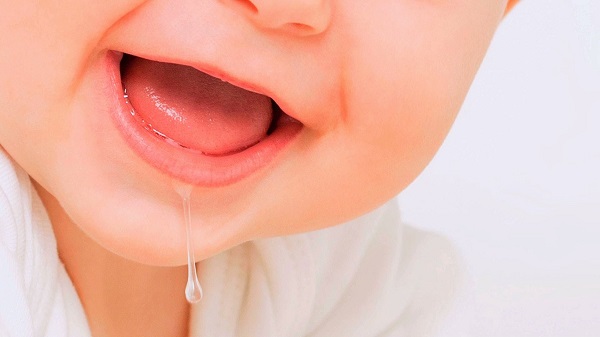Saliva is a watery liquid secreted into the mouth by glands, providing lubrication for chewing and swallowing, and aiding digestion. The salivary glands in the mouth produce 2 to 4 pints of saliva daily, according to webmd.com. Each time you swallow, your saliva helps neutralize stomach acids, lubricate the mouth, protect your mouth from bacteria and assist with digestion in the stomach.Occasionally, the production of saliva increases dramatically and becomes an uncomfortable nuisance or a serious medical concern.Excessive saliva has a variety of causes and its treatments should also vary. In this article, you will learn some causes and how to stop salivating accordingly.

How to Stop Salivating
Among the most common reasons why you do not know how to stop salivating, is that you are looking through the wrong lens. Now let's learn the reasons for excess salivating and how to stop salivating effectively.
1. Take Care of Baby Drooling
Babies drool all the time. In fact, almost all of us know how much babies can drool. When baby is teething (beginning at about 3 months), they will drool or produce lots of saliva to help cool off its inflamed and tender gum. Some other uncommon causes include structural anomalies in the mouth, enlarged tonsils, swallowing of foreign bodies which may be stuck in the throat, epiglottitis, tooth decay, oral trauma, bacterial and viral infections.
Treatment:When the symptoms of excessive salivation are simply too much, you may need to consult a doctor for a solution. If salivating is caused by teething, just use a bib to keep the baby cleaner and more comfortable, and gently wipe her chin during day time to get rid of that excessive drooling.
2. Mind the Denture in Mouth
There are many causes for excessive saliva production and wearing braces is one of them. Most often, the braces take up an unusual amount of space in the mouth, triggering the release of chemicals which cause excessive salivation, even too much saliva at night.
Treatment: Want to know how to stop salivating because of your braces? The best way to deal with this kind of salivation is to get your braces mended or get better fitting dentures. If you have denture and suck your pen or bite your nails, you will probably have excessive saliva.
3. Suck Lime During Pregnancy
Pregnancy may cause excess saliva production in women because of the excessive body hormones. So knowing how to stop salivating is vital formost pregnant woman.
Treatment: The best and most efficient way of reducing the amount of saliva that you produce is to suck on a lime. Cut a lime into thick slices and suck on one whenever you feel that you are producing a lot of saliva in your mouth.
4. Altering Your Sleep Habits
- Sleep on your back. Side-sleepers are more prone to drooling during the night simply because gravity is causing the mouth to open and allowing drool to pool on your pillow.
- Prop your head up. If you can't sleep without lying on your side, try to prop yourself in a more vertical position to encourage your mouth to close and create a better air flow.
- Breathe through your nose. The main reason that people drool is that their nasal sinuses are clogged. Try applying sinus-clearing products like Vick's Vaporub directly under your nose to loosen clogged nostrils.
- Treat sinus infections and allergies as soon as they surface. Untreated conditions can cause postnasal drip and excess saliva while you sleep.
5. Change Your Diet
One of the best foods for eliminating too much saliva is bland food that has a dry texture, including dry cereals, baked chips, crackers and toast. If your excess saliva production occurs throughout the day, pack small containers of crackers or dry cereal and keep them with you at all times.
But avoid sweet, spicy and sour foods because they can lead to instant, excessive saliva production in order to coat your throat and mouth. Foods that make you nauseous should be avoided because they cause stomach acid reflux triggering the production of saliva to neutralize the acid.
6. Take Some Medications
There are drugs (such as glycopyrrolate) that reduce saliva production and are prescribed to children and adults with neurological conditions who drool. Other medications, such as the antidepressant amitriptyline, cause a dry mouth.
Although these may help in extreme drooling, they aren't very effective and have undesirable side effects which may get in the way of the saliva's important functions. So before you take any medication, be sure to discuss with your doctor and take them exactly as instructed.
7. Resort to Surgery
People with obstructive tissue such as a deviated septum, enlarged tonsils, or an over-sized tongue may salivate too much and can be good candidates for various surgical procedures.
Nasal surgery consists of several procedures that can fix obstructions or deformities like deviated septum.A tonsillectomy can remove oversized tonsils that are obstructing your airway.
8. Treat Underlying Diseases
Excess saliva is often a temporary condition. But it can be caused by underlying diseases like mouth infections, teething, Bell’s palsy, gastro esophageal reflux disease (GERD), syphilis, rabies or tuberculosis. If you condition worries you, visit a doctor to find the causes and get the disease treated so as to stop the excessively salivating.